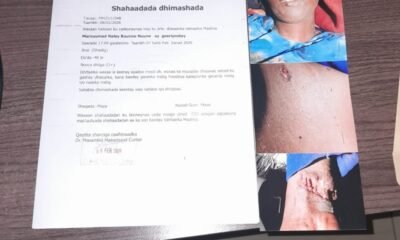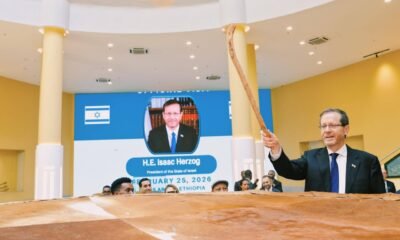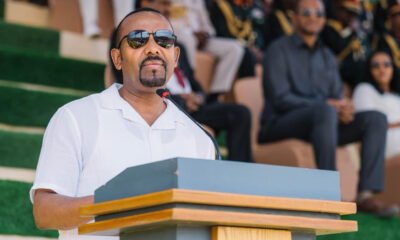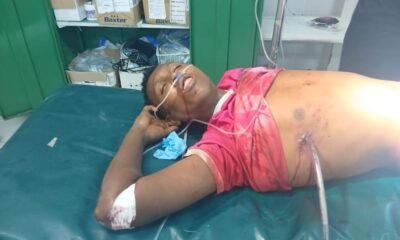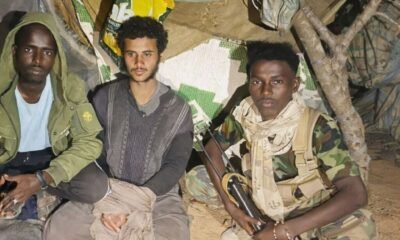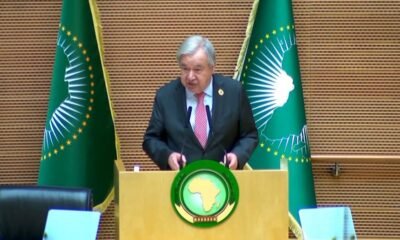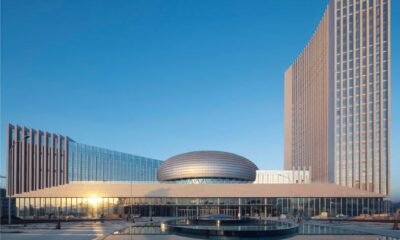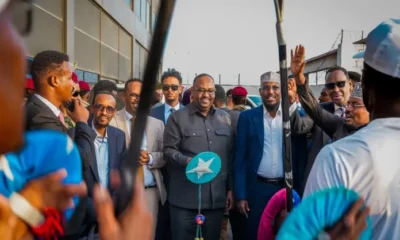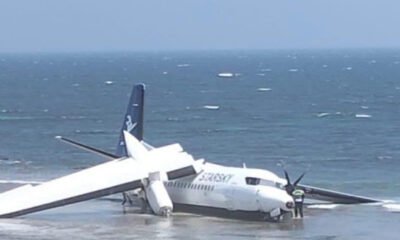Escalating Conflict
Ethiopian Air Force on High Alert Amid Somalia Tensions
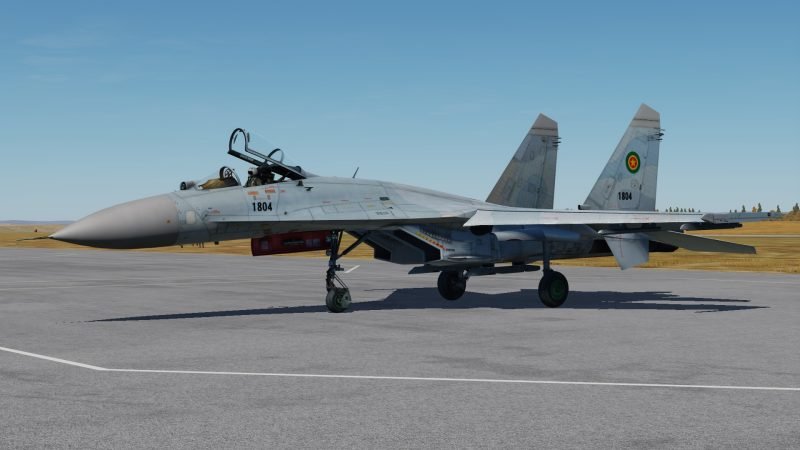
Heightened Readiness Signals Growing Security Concerns in Eastern Airspace
Ethiopia’s Air Force has announced it is on high alert, particularly guarding its eastern airspace amid increased military activities by Egypt and Somalia. This strategic move underscores Ethiopia’s commitment to protecting its sovereignty and responding to perceived threats in the volatile region.
Colonel Dereje Bushre, the head of Ethiopia’s Air Division, conveyed a message of unwavering readiness and vigilance. “The Ethiopian Air Force is fully prepared to meet any challenge and fulfill our national duty,” Bushre declared. The 3rd Air Division, known for its defense and support capabilities, is actively engaged in safeguarding Ethiopia’s airspace from potential incursions or attacks.
This heightened state of readiness comes as the Eastern Command of the Federal Ministry of Defense is also placed on full military alert. The Ethiopian national defense has emphasized its commitment to national security, declaring that its forces are ready to make the ultimate sacrifice to protect the nation against any threats, including those from foreign aggressors or terrorist activities.
The move reflects the broader regional anxieties, particularly as Egypt and Somalia ramp up their military presence and activities in the area. The Ethiopian government’s swift action highlights its concern over the growing instability and its determination to defend its territory from any potential incursions.
Ethiopia’s military posture serves as a stark reminder of the fragile security dynamics in the region, where geopolitical rivalries and shifting alliances are creating a tense atmosphere. The Ethiopian Air Force’s readiness is not only a tactical response but also a strategic message to neighboring countries and international observers about Ethiopia’s resolve to maintain its territorial integrity and protect its national interests.
Analysis
U.S. Target Chinese Students Over Espionage Fears, Sparking Diplomatic Backlash

Congressional panel demands data from universities as Beijing warns against violating rights of Chinese nationals studying in the U.S.
Tensions between Washington and Beijing have flared again, this time over Chinese students studying at U.S. universities. A congressional panel led by the House Select Committee on the Chinese Communist Party has formally requested data from six leading American institutions—Carnegie Mellon, Stanford, Purdue, USC, and others—regarding Chinese nationals in STEM fields. The panel alleges that these students may be embedded by Beijing to illicitly access sensitive research and advanced technologies.
The request, issued by committee chair Rep. John Moolenaar, reflects a growing wave of suspicion in Washington about the role of foreign students in U.S. research infrastructure. He described the current environment as a “dangerous crossroads,” where financial dependence on international tuition may be compromising national security. He further warned that academic campuses serve as “soft targets” for espionage, with the student visa system acting as a “Trojan Horse for Beijing.”
The accusations, while not new, signal an intensifying political push to scrutinize Chinese students and researchers more broadly. Lawmakers argue that Chinese nationals in U.S. programs tied to cutting-edge innovation—particularly in artificial intelligence, semiconductors, aerospace, and quantum computing—may be exploited by Beijing for strategic advantage.
Requests from the committee include data on research topics, funding sources, and institutional safeguards to prevent unauthorized access to federally funded projects. The implication is clear: lawmakers believe U.S. universities may be unwittingly contributing to China’s technological rise, particularly in areas with dual-use military potential.
However, this hardline stance has sparked significant backlash. Critics argue that sweeping generalizations about Chinese students risk veering into racial profiling and could undermine the very scientific openness that drives American innovation. Universities rely heavily on international students, especially from China, both for tuition and for their contributions to research and development.
Beijing was quick to condemn the move. Chinese Foreign Ministry spokesperson Mao Ning urged the U.S. to “stop overstretching the concept of national security” and to uphold the rights of Chinese students abroad. She emphasized that Chinese nationals make up roughly 25% of the international student population in the U.S. and contribute meaningfully to economic and technological advancement.
The latest controversy arrives amid an already fragile U.S.-China relationship, with disputes ranging from trade and technology to military posture in the Indo-Pacific. Beijing views the escalating rhetoric against its students as part of a broader campaign to contain China’s rise by restricting access to knowledge and collaboration.
Adding fuel to the fire, Republican Rep. Riley Moore introduced the “Stop CCP Visas Act”, which proposes banning Chinese citizens from studying or participating in exchange programs in the U.S. While the bill is unlikely to pass, it has generated alarm among civil rights groups and educators, who draw parallels to the Chinese Exclusion Act of 1882—a now-defunct law that restricted Chinese immigration for over 60 years.
The proposal has been met with strong resistance, not only from Democrats but also from within the higher education sector, which warns of long-term harm to America’s reputation as a global hub for academic excellence.
This clash over Chinese students encapsulates a broader dilemma in U.S.-China relations: how to safeguard national security without undermining openness and academic collaboration. While lawmakers raise valid concerns about espionage and intellectual property theft, targeting students en masse risks harming diplomatic relations, educational institutions, and America’s own innovation ecosystem.
At a time when global collaboration is vital to address challenges from climate change to pandemics, narrowing educational channels may prove counterproductive. How Washington navigates this balance will shape not only its scientific leadership but also the character of its global partnerships.
Analysis
Will Europe’s Nuclear Ambitions Trigger a New Arms Race? Inside the Continental Shift
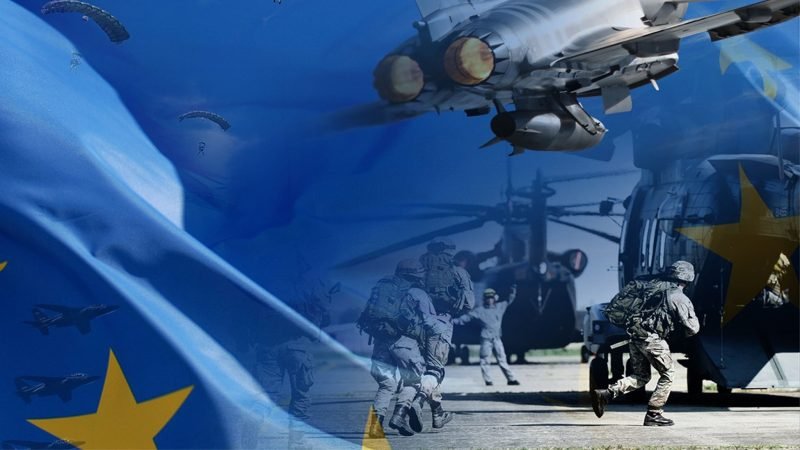
The increasing debate over European defense, particularly regarding the potential development of nuclear capabilities, represents a significant pivot from post-World War II priorities that focused primarily on economic and social development. The shift is largely a response to heightened geopolitical tensions, notably the ongoing conflict in Ukraine, which has exposed vulnerabilities in Europe’s security architecture and heightened fears of Russian aggression.
European nations are increasingly considering enhancing their military prowess, including nuclear options, as a deterrent against potential threats. France, under President Emmanuel Macron, is taking notable steps by modernizing its nuclear arsenal, including a significant investment in airbases and hypersonic missiles. Macron’s proposition to extend France’s nuclear umbrella over other European countries could significantly shift the continent’s defense landscape.
This militaristic pivot could have profound economic implications. Redirecting funds towards defense spending may strain budgets and shift focus from vital social programs, which could affect public welfare. The economic impact, however, isn’t solely negative; increased defense spending could spur advancements in technology and create jobs in defense and related sectors.
The prospect of European nations developing nuclear weapons introduces risks of a regional arms race, which could undermine global non-proliferation treaties and escalate tensions further. While the technology and capability to develop such weapons exist, their proliferation would likely exacerbate global security threats rather than mitigate them.
Focusing on strengthening conventional military capabilities could offer a viable alternative to nuclear armament. Collaborative defense efforts, such as joint military exercises and shared intelligence, could bolster security without the risks associated with nuclear weapons.
Europe must find a balance between defense spending and maintaining robust social welfare systems. This balance is crucial to ensure that the enhancement of security measures does not undermine the quality of life and economic stability that characterize European societies.
Upholding international non-proliferation treaties is essential. Europe should take a leadership role in promoting nuclear disarmament and encouraging global efforts to reduce reliance on nuclear arsenals as security tools.
Diplomatic efforts remain crucial in addressing the underlying causes of security tensions. Europe should lead in advocating for diplomatic resolutions to conflicts, particularly in Eastern Europe and the broader region, to reduce the perceived need for nuclear deterrence.
Maintaining public trust through transparency about defense strategies and their implications is vital. Engaging the public in these discussions can foster broader understanding and support for the paths chosen by their leaders.
In summary, while the pressures of an evolving security landscape are prompting a reassessment of defense strategies across Europe, the path forward should prioritize stability, peace, and the continued prosperity of the region. The focus should be on strengthening conventional capabilities and reinforcing international norms against nuclear proliferation, ensuring that Europe remains a strong, stable, and peaceful actor on the global stage.
Escalating Conflict
M23 Rebels Seize Parts of Goma, Leaving Somali Traders Stranded Amid Conflict
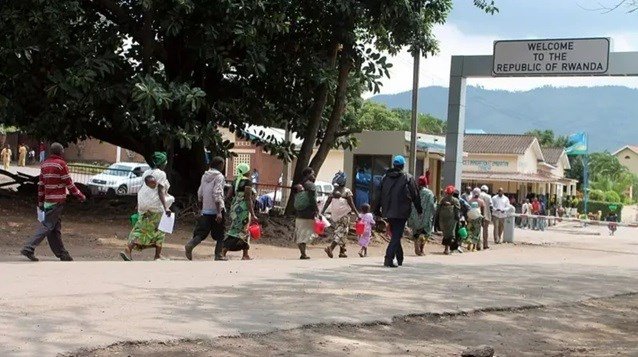
Intense fighting in eastern DR Congo disrupts trade, forcing Somali business owners into hiding as violence escalates.
The M23 rebel group’s advance into Goma, a key economic hub in eastern DR Congo, has paralyzed trade, displaced thousands, and left Somali business owners stranded. With ongoing clashes between M23 and government forces, reports indicate that at least 17 people have been killed, while over 300 are injured. Thousands of civilians, including the city’s Somali traders, are sheltering indoors as gunfire and explosions continue.
Somali entrepreneurs in Goma’s fuel and cargo trade have been particularly hard-hit, with businesses shuttered and supply chains disrupted. “We rely on fuel trade, but everything has stopped,” said Subeyr Haji, a Somali businessman. He noted that while no Somali casualties have been reported, the situation remains dire, with no flights or movement of goods as Goma’s airport remains shut.
International calls for a ceasefire are growing. Kenyan President William Ruto has called an emergency summit involving DR Congo and Rwanda’s leaders to seek a resolution. Meanwhile, 400,000 people have fled North and South Kivu provinces, worsening the humanitarian crisis.
The Congolese government insists it still controls key positions, including the airport, but uncertainty looms as M23 strengthens its hold. With trade halted, civilians trapped, and aid blocked, the fate of Goma’s residents—including its Somali business community—hangs in the balance.
Escalating Conflict
Puntland Denies Federal Claims of Delivering 200 Tons of Food Aid

Regional authorities refute Somalia’s federal assertion of providing aid to Bosaso, calling for evidence and maintaining their independent management of humanitarian resources.
The semi-autonomous Puntland region has firmly rejected claims from Somalia’s National Disaster Management Agency (SODMA) that 200 tons of federal food aid were delivered to the port city of Bosaso. The statement from Puntland’s Minister of Relief and Disaster Management, Ubah Abdirashid Hirsi, underscores a widening rift between the regional administration and Mogadishu over resource control and governance.
“No aid has been received from the Federal Government of Somalia,” Ubah declared, emphasizing that Puntland independently manages all international aid without federal involvement. She challenged SODMA to provide evidence supporting its assertion, reiterating Puntland’s commitment to transparency and ensuring that aid reaches vulnerable populations responsibly.
SODMA had earlier announced that it delivered the aid to support communities affected by widespread drought and displacement, part of a broader federal effort to address Somalia’s escalating humanitarian crisis. However, Puntland’s denial throws the agency’s claim into question, raising concerns about misinformation and the politicization of aid in the country.
This dispute highlights the broader tensions between Puntland and Somalia’s federal government, which have long been at odds over issues of autonomy and resource management. Puntland frequently accuses Mogadishu of inefficiency and overreach, insisting on its right to control aid distribution and development initiatives within its borders.
The fallout from this controversy risks exacerbating Somalia’s already fragile humanitarian landscape. With millions of Somalis affected by drought, displacement, and conflict, effective coordination between federal and regional authorities is crucial. However, the ongoing power struggle undermines efforts to deliver timely and adequate assistance to those in need.
Puntland’s pushback against federal claims also signals its determination to assert its autonomy and ensure accountability in managing resources for its population. As Somalia grapples with mounting humanitarian challenges, resolving these disputes will be essential for building trust and fostering collaboration between federal and regional authorities.
Editor's Pick
Open Letter to President Abdirahman Mohamed Abdullahi Irro

Dear President Irro,
Congratulations on your recent election as the President of Somaliland! As you embark on this significant journey, I write to share my thoughts and insights on building a new government that can elevate Somaliland’s status and secure its rightful place as the 55th state in Africa. This is a pivotal time, not only for Somaliland but also for the broader Horn of Africa,
Your government must be characterized by expertise and excellence, drawing from a diverse pool of scholars and professionals. Prioritize appointing individuals with proven track records in their respective fields, particularly for key roles such as in the Foreign Ministry, which is crucial for advancing Somaliland’s cause on the global stage. Strive to appoint individuals not merely based on clan or political affiliation, but on merit and capability. This approach will demonstrate your commitment to unity and progress, setting a new standard for governance in Somaliland.
While traditional leadership and community elders play a vital role in Somaliland’s political landscape, it is essential to select individuals for government positions carefully. Create a process that values skill over tribal loyalty, ensuring that your cabinet members can effectively carry out their duties while gaining the trust of the public. Seek out talent among the diaspora and within communities who have the necessary expertise and vision to aid in your government’s goals.
Adopt a governance model built on transparency and accountability. Establish systems that encourage public participation in decision-making processes. This could include regular town hall meetings and avenues for citizen feedback. By fostering an environment where the population feels heard and valued, you can build a stronger, more united Somaliland.
In addition to filling key positions with qualified individuals, develop a robust diplomatic strategy. Engage with potential allies and partners who recognize Somaliland’s aspirations for international recognition. Utilize skilled diplomats who can articulate Somaliland’s vision and navigate complex geopolitical landscapes, enhancing Somaliland’s standing in the global community.
Articulate a comprehensive development plan that addresses the economic, social, and infrastructural needs of Somaliland. Focus on initiatives that not only boost economic growth but also promote education, health, and sustainable practices. Your administration should work closely with local communities to ensure that development initiatives reflect the needs and aspirations of the people, fostering a sense of ownership.
Recognize the importance of the Somaliland parliament in your efforts. Collaborate with both houses to ensure that your legislative agenda aligns with national priorities. Encourage constructive dialogue between the executive and legislative branches to foster cooperative governance. While the current parliament may be supportive, this cooperation should be focused on policies that benefit all Somalilanders, regardless of their political affiliation.
Your presidency presents an extraordinary opportunity to reshape the political landscape of Somaliland. By focusing on expertise, inclusivity, accountability, and constructive diplomacy, you can create a legacy that not only achieves national recognition but also builds a stable, prosperous home for all Somalilanders. Remember, history will remember your ability to unite and lead with vision and purpose.
In conclusion, as you take these initial steps to form your government, I urge you to prioritize the values of meritocracy, transparency, and inclusiveness. These principles will serve as the bedrock of your administration and will be essential as Somaliland continues its journey towards full recognition on the international stage.
Wishing you wisdom and success,
SOMALILANDER
Escalating Conflict
Why El Fasher’s Battle Is Crucial to Sudan’s Future
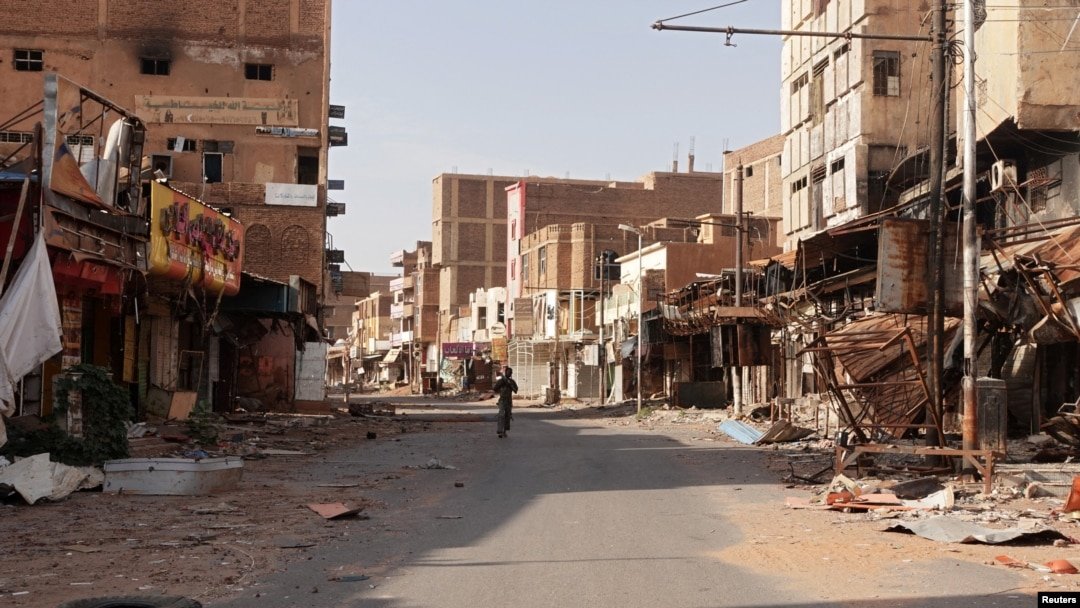
The strategic and symbolic significance of Sudan’s El Fasher amid ongoing conflict and humanitarian crisis
El Fasher, the capital city of North Darfur—is now a focal point in the intense conflict between Sudan’s army and the paramilitary Rapid Support Forces (RSF). This conflict, which erupted in April 2023, has led to a severe humanitarian crisis, displacing millions and causing widespread devastation. Understanding the importance of El Fasher provides insight into why this city is central to Sudan’s broader conflict and future stability.
El Fasher’s significance extends beyond its geographical location. Historically, it was the cultural and administrative heart of the Sultanate of Darfur, a region that thrived from the 17th to the 19th centuries. As North Darfur’s capital, El Fasher has evolved into a pivotal administrative, diplomatic, and cultural center. Its strategic location connects it to key regional cities and supports major agricultural and livestock industries. The city’s economy relies heavily on the cultivation of millet, sorghum, and groundnuts, as well as its livestock sector, making it a critical hub for food supply both locally and nationally.
Since the conflict began, El Fasher has faced an escalating humanitarian crisis. The RSF’s ongoing siege has cut off crucial supplies and aid, resulting in severe shortages of food, medicine, and fuel. The city, which previously served as a refuge for displaced individuals from across Darfur and beyond, is now struggling with soaring prices and increasing child malnutrition rates. The blockade has trapped hundreds of thousands of displaced persons who sought safety in El Fasher, while indiscriminate shelling and air strikes have decimated homes and essential infrastructure.
El Fasher’s population is ethnically diverse, including African tribes such as the Fur, Zaghawa, and Masalit, as well as Arab tribes predominantly from South and East Darfur. This diversity has historically contributed to strong social support networks, making the city a microcosm of Sudan’s complex ethnic landscape. The RSF’s actions in El Fasher, coupled with previous reports of ethnic cleansing in other areas, exacerbate the risk of deepening ethnic tensions and conflict.
The potential fall of El Fasher could have far-reaching consequences for regional stability. The city’s fall could trigger further displacement and instability in neighboring countries like Chad, Niger, and Mali. The destruction of El Fasher’s infrastructure—affecting electricity, water, and healthcare services—has already had a profound impact on daily life, with hospitals struggling to treat the influx of wounded civilians.
The potential collapse of El Fasher highlights the urgent need for a coordinated global response to Sudan’s conflict. Addressing the root causes of the conflict, promoting inclusive governance, and supporting humanitarian efforts are crucial steps toward stabilizing the country. Developing resilient infrastructure and adopting conflict-sensitive planning principles are essential for ensuring long-term stability and prosperity in Sudan.
El Fasher’s current plight serves as a stark reminder of the broader challenges facing Sudan and the need for comprehensive, forward-thinking solutions to secure a peaceful and stable future.
Editor's Pick
US Intel Unveils Russian Military’s Hidden Role with Houthis in Yemen
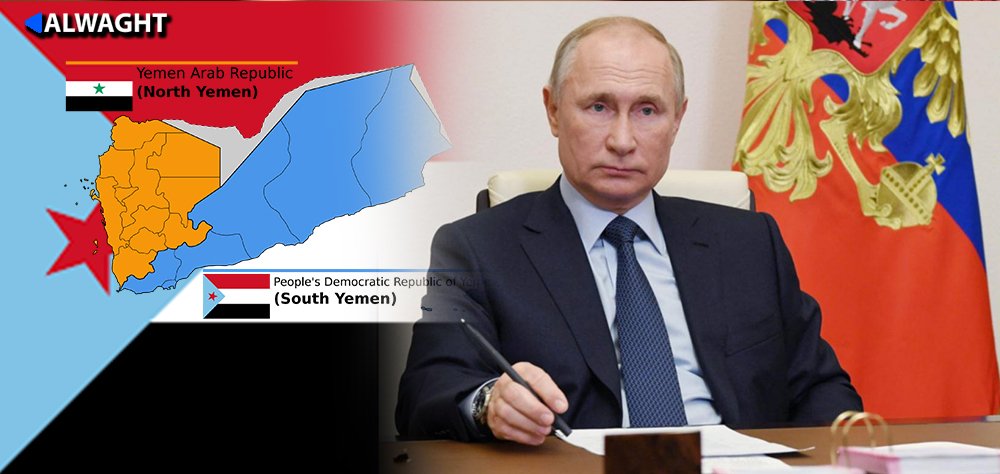
GRU Officers Advising Iran-Backed Rebels on Red Sea Maritime Attacks
US intelligence suggests that Russian military intelligence officers, specifically from the GRU, have been operating within Houthi-controlled regions of Yemen. Their mission? To aid the Iran-backed Houthis in targeting commercial vessels in the Red Sea. This covert operation has been ongoing for several months, a senior US official disclosed under the condition of anonymity.
The precise nature of the GRU’s involvement remains shrouded in secrecy, but their advisory role is clear. The Houthis, claiming solidarity with besieged Palestinians in Gaza, have intensified their attacks on maritime targets, drawing on Russian expertise to bolster their campaign.
This development signals Russia’s deepening ties with the Houthis, a move that could reshape the balance of power in the region. Earlier this year, President Vladimir Putin contemplated arming the Houthis with advanced anti-ship cruise missiles, a plan thwarted only by Saudi Crown Prince Mohammed bin Salman’s intervention. Yet, concerns linger in Washington that Putin might still use the Houthis as leverage against US policies, especially concerning Ukraine.
Samuel Ramani, a renowned expert on Russia’s Middle Eastern policies, suggests that deploying technical advisors might be Putin’s middle ground, allowing him to deepen cooperation without overtly escalating military support. The move aligns with Russia’s broader strategy of embedding itself in regional conflicts, as seen with its mercenaries in Libya and military presence in Syria.
The timing of this revelation is critical. The Houthis have ramped up missile and drone attacks on commercial vessels since Hamas’ assault on Israel on October 7th. While US retaliatory strikes on the Houthis have been ineffective, the group’s attacks have been selective, sparing ships linked to Russia, Iran, and China. This selective targeting underscores the Houthis’ maritime intelligence limitations and their reliance on open-source data, further highlighting the need for GRU expertise.
Publicly, Russia’s engagement with the Houthis has become more visible. In July, Putin’s deputy foreign minister met with a Houthi delegation in Moscow, signaling a closer alliance. The US anticipates that Iran’s “axis of resistance,” which includes the Houthis, will play a pivotal role in any retaliatory actions against Israel.
Former US officials suggest that Putin might view the escalating Middle East tensions as an opportunity to pressure the US, drawing a parallel between Ukraine’s attacks on Russian vessels in the Black Sea and potential Houthi actions in the Red Sea. General Frank McKenzie, ex-commander of US Central Command, hinted that Putin could see this as a form of “Red Sea payback.”
Despite the mounting evidence, official responses from the White House and the Department of Defense remain absent. The US intelligence community, however, is on high alert, closely monitoring the situation as the geopolitical stakes in the region continue to rise.
Russia’s strategic maneuvering in Yemen is part of a broader pattern. With the Wagner Group’s activities in Libya and the Sahel, and military deployments in Syria, Russia’s footprint in the Middle East is expanding. The potential for a Russian naval base in Sudan’s Red Sea coast only adds to this intricate geopolitical web.
In this complex game of power and influence, Putin’s decision to place GRU officers in Yemen reflects a calculated move to enhance the Houthis’ operational capabilities while safeguarding Russian interests in the Red Sea. As tensions escalate, the world watches closely, bracing for the potential fallout from this clandestine collaboration.
Escalating Conflict
DR Congo faces catastrophic health, humanitarian crisis
Escalating Conflict, Widespread Disease, and Neglect: How the World is Failing the People of DR Congo
The Democratic Republic of Congo (DRC) teeters on the brink of collapse, mired in a catastrophic health and humanitarian crisis largely fueled by escalating violence in the eastern region. The World Health Organization (WHO) has sounded the alarm, highlighting the dire situation where millions are in desperate need of assistance.
Dr. Adelheid Marschang, a senior emergency officer at WHO, emphasized the gravity of the crisis: “The DRC now has the highest number of people in need of humanitarian aid in the entire world, with 25.4 million affected.” This stark reality stems from a surge in violence by armed groups, notably the Rwandan-backed M23 Tutsi-led rebels—a claim Rwanda denies. The conflict has triggered mass displacement, rampant disease, gender-based violence, and severe mental trauma.
One of the most pressing issues is the severe underfunding of aid efforts. The United Nations’ $2.6 billion Humanitarian Response Plan for 2024, aimed at assisting 8.7 million people, is a mere 16% funded. The WHO, in particular, has received only $6.3 million of the $30 million required to address the crisis adequately. Marschang warns that without sufficient funding, the situation is bound to worsen.
The humanitarian impact is devastating. Mass movements of people have overwhelmed water and sanitation systems, leading to outbreaks of cholera, measles, meningitis, mpox, and even the plague. In the first half of this year alone, over 20,000 cases of cholera, including 274 deaths, were reported in North Kivu province, alongside 65,415 cases of measles, resulting in 1,523 deaths. These figures are likely underreported due to limited disease surveillance and data reporting.
Compounding the health crisis is the escalating food insecurity. According to the latest IPC Chronic Food Insecurity report, approximately 40% of the DRC’s population—40.8 million people—face serious food shortages, with 15.7 million experiencing severe food insecurity. This dire situation is exacerbated by armed conflict and displacement, forcing families to abandon their farms and livelihoods.
Children are among the most vulnerable. Marschang highlighted that 1 million out of 6.9 million malnourished children are at risk of becoming severely acutely malnourished without specialized therapeutic treatment. This condition not only weakens their immune systems, making them susceptible to deadly infectious diseases but also has long-term cognitive consequences.
The situation is further complicated by the resurgence of mpox, with over 11,000 cases and 445 deaths reported this year, primarily affecting children. The overcrowded camps in and around Goma, particularly those in North Kivu province, are hotspots for the virus. The combination of military activities around these camps and targeted attacks underscores the difficulty of containing the disease amidst ongoing conflict.
The withdrawal of the U.N. peacekeeping force MONUSCO from South Kivu has created a potential security vacuum, increasing the risk of further displacement and violence. Marschang warned, “This could throw us further into a situation of increasing numbers of displaced, of victims of violence, with the whole vicious cycle just continuing.”
The international community’s response to this crisis has been woefully inadequate. Despite numerous attempts to raise awareness and funds, the DRC remains one of the most underfunded humanitarian crises globally. The situation demands immediate and robust international intervention to provide the necessary relief and to address the root causes of the conflict and instability.
As the world watches, the people of the Democratic Republic of Congo continue to suffer. It is imperative that global leaders and humanitarian organizations act swiftly and decisively to avert a further escalation of this humanitarian catastrophe. The DRC’s crisis is not just a regional issue but a global one, and it requires a concerted effort to bring hope and relief to millions of affected individuals.
-

 Somaliland1 month ago
Somaliland1 month agoF-35s Over Hargeisa: The Night Somaliland’s Sovereignty Went Supersonic
-

 Somalia1 month ago
Somalia1 month agoAid Destroyed, Trust Shattered: Somalia Loses U.S. Support for Good
-

 Terrorism2 months ago
Terrorism2 months agoForeign ISIS Pipeline Exposed: Puntland Captures Dozens of Non-Somali Fighters
-

 Somaliland1 month ago
Somaliland1 month agoSomaliland at Davos: The Moment Somaliland Entered the World’s Inner Circle
-

 Terrorism1 month ago
Terrorism1 month agoAmerica Pulls Back From Somalia but Doubles Down Next Door
-

 Top stories2 months ago
Top stories2 months agoSomali Pirates Hijack Chinese Fishing Vessel off Puntland Coast
-

 Opinion2 months ago
Opinion2 months agoTurkey’s Selective Morality: From the Ruins of Gaza to the Red Sea
-

 Middle East2 months ago
Middle East2 months agoUS War Plans Against Iran Enter Advanced Stage


